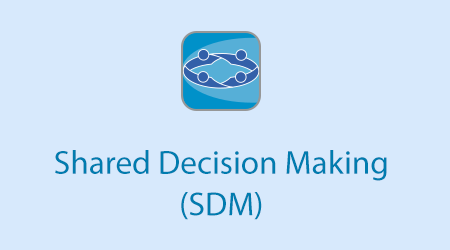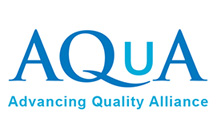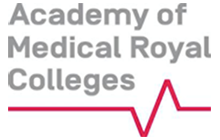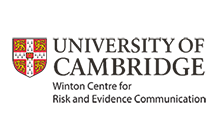Making a good decision
SDM is not just about ensuring the patient is involved with the process, it is also about making sure the decision reached is a good decision. A good decision is one that is approached systematically, is based on reliable, evidence-based information, and with time allowed to consider all the options carefully. The examples chosen are used to help get people to think about making good decisions.
Who is this tool for?
The Shared Decision Making elearning package is suitable for all healthcare professionals, health improvement personnel and patient engagement representatives to inform and educate them on Shared Decision Making in order to embed it in day to day clinical practice. Shared Decision Making represents a cultural change in behaviour and this tool will aid and assist in changing an environment of medical paternalism to a more inclusive approach based on the 2012 Health Act ‘Liberating the NHS: ‘No decision about me without me’.
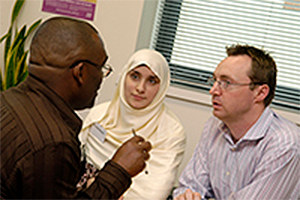
Patient participation in decision making
Not being properly told about their illness and the options for treatment is the most common cause of patient dissatisfaction. Most patients want more information and a greater say in decisions about how they will be treated. Shared Decision Making (SDM) is a process in which patients are encouraged to participate in selecting appropriate treatments or management options.
In Shared Decision Making, patients are involved as active partners with their health professional in clarifying acceptable medical options and choosing a preferred course of clinical care. Shared Decision Making is appropriate in any situation when there is more than one reasonable course of action and no one option is self-evidently best for everyone. This situation is very common since there are often many ‘preference-sensitive’ decisions. In these cases, the patient’s attitude to the likely benefits and risks should be a key factor in the decision.
Sources of expertise
SDM relies on two sources of expertise:
- The health professional is an expert on the effectiveness, probable benefits and potential harms of treatment options
- The patient is an expert on herself, her social circumstances, attitudes to illness and risk, values and preferences
Both parties must be willing to share information and accept responsibility for joint decision-making. The clinician must provide patients with information about the diagnosis and treatment options and the patient must tell the clinician about their preferences.
Course - Talking about What Matters
Talking About What Matters is a course developed by HEE West Midlands intended to explore in greater depth the interactions between doctors and patients that help create a meaningful outcome to consultations.
The course consists of a series of patient scenarios and is designed to be applicable across primary care and not confined to medical professionals.
Access the course here: https://portal.e-lfh.org.uk/Component/Details/429363
Course - Communicating Risk - Primary Care, Perioperative Medicine, Obstetrics & Gynaecology, Ophthalmology and Plastic Surgery
The Communicating Risk course was originally commissioned by the Australian Commission on Safety and Quality in Health Care and has been licensed to the Academy of Medical Royal Colleges (AoMRC) as part of Choosing Wisely UK. It has been adapted for the UK by the Winton Centre for Risk and Evidence Communication at the University of Cambridge.
There are five versions of this course – aimed at primary care professionals, perioperative medicine professionals, obstetricians & gynaecologists, ophthalmologists and plastic surgeons. Each course is designed to help clinicians from these specialties develop skills for communicating effectively with patients about the risks and benefits of treatment options. Each course consists of four sessions and will take approximately two hours to complete, with each session taking approximately 30 minutes to complete.
Health decisions often have no single ‘best choice’ and require choosing from multiple options, each with potential benefits, harms, trade-offs and uncertainties. For patients (and carers) to understand and have the opportunity to be actively involved in sharing decisions, clinicians need to provide relevant and clear information about the options, and the potential benefits and harms of each. This information should reflect the best available evidence and also take into account the patient’s personal opinions, preferences, values and priorities. This often requires analysis and being able to convey quite complex numerical information. Yet few clinicians have any training in how to do this.
Each version of the course includes examples taken from the relevant specialty, but is suitable for any healthcare professional. It includes self-test questions and video consultation case-studies. By the end of each course, participants will be able to:
• describe why it is important for clinicians to effectively communicate benefits, harms, trade-offs and uncertainties with patients
• explain the inter-relationship between shared decision making, evidence-based medicine and patient-centred care in the context of communicating benefits and
• list key communication skills needed when talking with patients about evidence
• explain how to effectively communicate statistical information to patients
• outline the role of decision support tools, potential uses and where to locate them
Authors
• Professor Tammy Hoffmann, PhD Professor of Clinical Epidemiology, Centre for Research in Evidence-Based Practice, Bond University, Australia
• Professor Chris Del Mar, MD, FRACGP, FAFPHM Professor of Public Health and General Practitioner, Centre for Research in Evidence-Based Practice, Bond University, Australia
• Dr Raquel Newman, BVSc, MANZCVSc (Emergency and critical care), EMA. Medical Writer.
• Dr Ramai Santhirapala FRCA FFICM FHEA, Clinical Lead, Choosing Wisely UK, Academy of Medical Royal Colleges
• Dr Alexandra Freeman, Executive Director, Winton Centre for Risk and Evidence Communication
The authors were also assisted by a steering committee in risk communication and other contributors and reviewers from a range of clinical specialties.
Access the (Primary Care) course here: https://portal.e-lfh.org.uk/Component/Details/543925
Access the (Perioperative Care) course here: https://portal.e-lfh.org.uk/Component/Details/543859
Access the (Ophthalmology) course here: https://portal.e-lfh.org.uk/Component/Details/604821
Access the (Obstetrics and Gynaecology) course here: https://portal.e-lfh.org.uk/Component/Details/603796
Access the (Plastic Surgery) course here: https://portal.e-lfh.org.uk/Component/Details/608413
How to access
In order to access the Shared Decision Making programme, you will need an elfh account. If you do not have one, then you can register by selecting the Register button below.
To view the Shared Decision Making programme, select the View button below. If you already have an account with elfh, you will also be able to login and enrol on the programme from the View button.
NHS healthcare staff in England
The Shared Decision Making programme is also available to NHS healthcare staff via the Electronic Staff Record (ESR). Accessing this elearning via ESR means that your completions will transfer with you throughout your NHS career.
Further details are available here.
Not an NHS organisation?
If you are not an NHS health or care organisation and therefore do not qualify for free access elfh Hub, you may be able to access the service by creating an OpenAthens account.
To check whether or not you qualify for free access via OpenAthens, you can view the eligibility criteria and register on the ‘OpenAthens’ portal.
Registering large numbers of users
If you are a HR, IT or Practice Manager and would like to register and enrol large numbers of staff within your organisation for access onto the Shared Decision Making programme, please contact elfh directly.
Organisations wishing to use their own LMS
For HR departments wanting to know more about gaining access to courses using an existing Learning Management System please contact elfh directly to express interest.
More information
Please select the following link for more information on how to use the elfh Hub.



